Искореняя ересь: Чудо-винтовки...Интерлюдия 4: Читая Майн Рида...
Оригинал взят у borianm в Искореняя ересь: Чудо-винтовки...Интерлюдия 4: Читая Майн Рида...
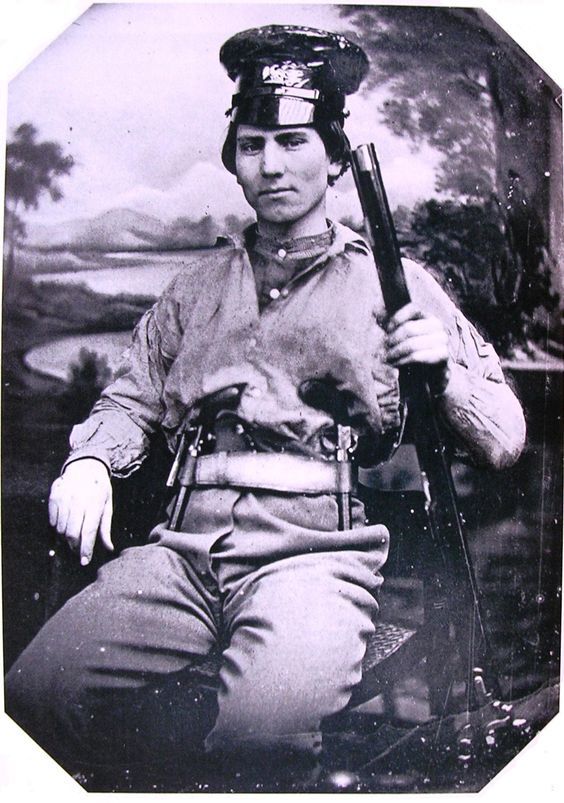
Неизвестный доброволец - стрелок, 1846-47 гг
На эту интерлюдию меня натолкнуло совершенно случайно упоминание в обсуждении прошлой интерлюдии произведений Томаса Майн Рида (я в курсе, что правильно было бы его второе имя произносить как Мэйн, но так уж исторически сложилось). Дело в том, что первое его литературное произведение (на самом деле я бы назвал его 1.5) - "Вольные стрелки" ("The Rifle Rangers"), опубликованное в 1850-м году и основанное на более раннем "Военная жизнь, или Приключения офицера легкой пехоты" [War Life; or, The Adventures of a Light Infantry Officers] (1849), которое я в электронном виде к сожалению не нашел, было основано на личном опыте - писатель воевал в чине второго лейтенанта в Первом Нью-Йоркском Волонтерском полку, участвовал в десанте под Вера-Крусом, а при штурме Чапультепека получил тяжелое ранение в бедро. Потому, несмотря на то, что перед нами несомненно прежде всего литературное произведение, изобилующие романтичными штампами того времени: благородный герой, подлый соперник, верные помощники, схватка с крокодилом, прекрасная сеньорита с усами - я не шучу "and a dark shading along the upper lip-a moustache, in fact-soft and silky as the tracery of a crayon, contrasted with the dazzling whiteness of her teeth......the dark tracery over the lip, so rarely seen in the lineaments of her sex-even these were attractions.", произведение дает нам довольно интересный пример схватки волонтерской стрелковой роты, вооруженной скорее всего Model 1841 U.S. Percussion Rifle, .54, она же “Jager,” (“Yager” и “Yaeger”) и частично возможно личными винтовками, с мексиканской иррегулярной кавалерией, а затем артиллерией, и применения дальнобойной винтовки европейского происхождения, на мой взгляд скорее всего стержневой крепостной винтовки, для подавления легкого мексиканского орудия.... Надо сказать ,что русский перевод, как водится, говно полное, есть мнение что переводили не с оригинала, а как тогда было принято - с французского перевода ,а потом только перевели на новую орфографию. Потому советую ориентироваться на оригинал. Начнем-с:
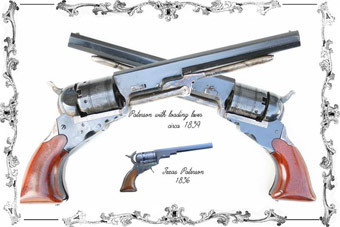
My sword-a fine Toledo, taken from a Spanish officer at San Jacinto-hung over the mantel, rusting ingloriously. Near it were my pistols-a pair of Colt’s revolvers-pointing at each other in sullen muteness. A warlike ardour seized upon me, and clutching, not the sword, but my pen, I wrote to the War Department for a commission; and, summoning all my patience, awaited the answer.
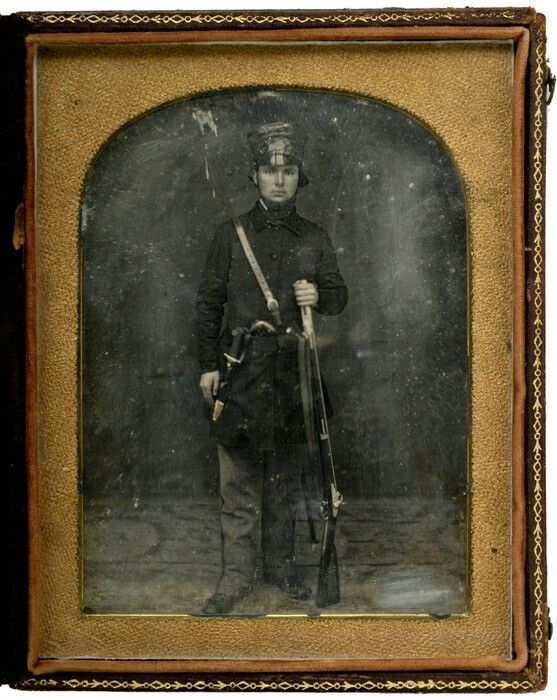
ГГ выборный капитан некой роты вольных стрелков - добровольческого подразделения Армии САСШ, сформированной в Новом Орлеане и вооруженных некими rifles. После высадки под Вера-Крусом роте ставится задача добыть мулов и они направляются вглубь враждебной территории. В роте есть мальчик-кавалерист с оружием на его рост: Jack wore a tight-fitting green jacket, trimmed with yellow lace, and buttoned up to the throat; pantaloons of light green, straight cut, and striped along the seams; a forage-cap set jauntily upon a profusion of bright curls; a sabre with a blade of eighteen inches, and a pair of clinking Mexican spurs. Besides these, he carried the smallest of all rifles. Thus armed and accoutred, he presented the appearance of a miniature Ranger. Для начала ГГ со своими людьми сталкивается таки с мексиканским кайманом: I had brought with me a light rifle. It was but the work of a moment to unsling and level it. The sharp crack followed, and the ball impinged between the monster’s eyes, glancing harmlessly from his hard skull as though it had been a plate of steel. The shot was an idle one, perhaps worse; for, stung to madness with the stunning shock, the reptile sprang far out into the water, and made directly for its victims.
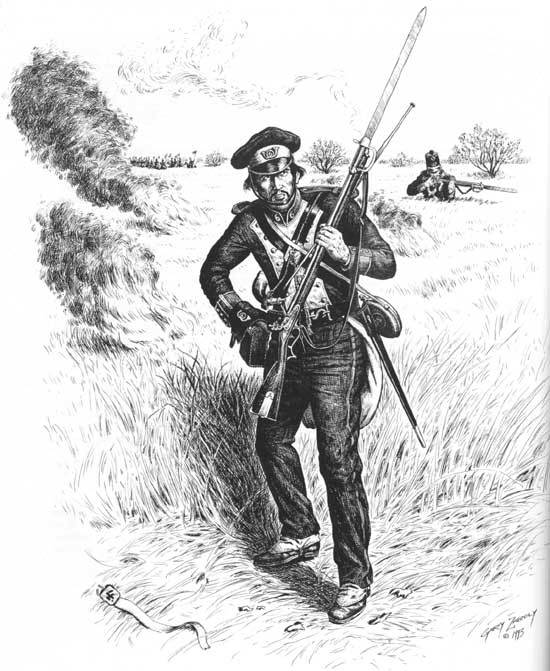
Противник - мексиканский застрельщик с винтовкой Бейкера со штыком...
Т.е. личная винтовка/штуцер героя крокодильчика не взяла....В тот период боевые офицеры часто носили нарезные штуцера, сделанные на заказ.... При этом у винтовок упоминаются штыки, что для М1841 странно. Впрочем в те годы встречается упоминание использования в качестве штыка, а точнее багинета, ножей и кинжалов..... Цвет формы по описанию тоже необычный, но у волонтеров-стрелков возможно было такое....
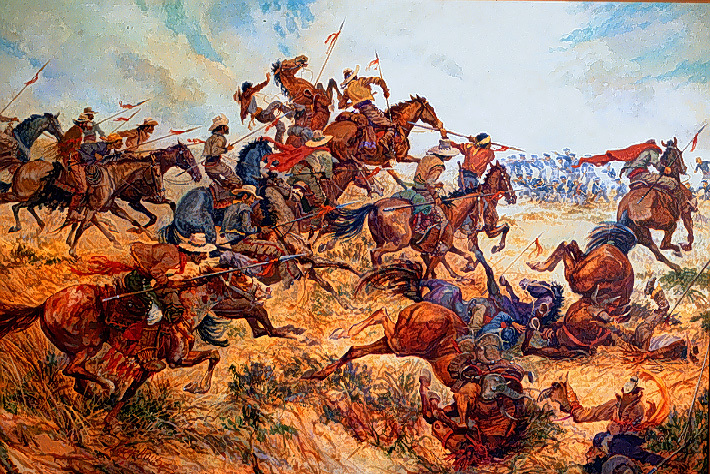
Потом они, найдя табун мулов, пытаются загнать его в корраль, но подвергаются атаке иррегулярной кавалерии - Rurales. Приведу все, что привлекло моё внимание в этом отрывке, а ниже дам его понимание (не перевод) на русском:
The mules were already within fifty paces of the entrance, the soldiers coming up about two hundred yards in the rear, when a noise like the tramping of many hoofs arrested our attention. The quick, sharp note of a cavalry bugle rang out across the plain, followed by a wild yell, as though a band of Indian warriors were sweeping down upon the foe.In an instant every eye was turned, and we beheld with consternation a cloud of horsemen springing out from the woods, and dashing along in the headlong velocity of a charge. It required but a single glance to satisfy me that they were guerilleros. Their picturesque attire, their peculiar arms, and the parti-coloured bannerets upon their lances were not to be mistaken.
We stood for a moment as if thunderstruck; a sharp cry rose along the deployed line. I signalled to the bugler, who gave the command, “Rally upon the centre!” As if by one impulse, the whole line closed in with a run upon the gates of the inclosure. The mules, impelled by the sudden rush, dashed forward pell-mell, blocking up the entrance. On came the guerilleros, with streaming pennons and lances couched, shouting their wild cries: “Andela! andela! Mueran los Yankees!” (Forward! forward! Death to the Yankees!)

The foremost of the soldiers were already upon the heels of the crowded mules, pricking them with bayonets. The animals began to kick and plunge in the most furious manner, causing a new danger in front.“Face about-fire!” I commanded at this moment. An irregular but well-directed volley emptied half a dozen saddles, and for a moment staggered the charging line; but, before my men could reload, the guerilleros had leaped clear over their fallen comrades, and were swooping down with cries of vengeance. A dozen of their bravest men were already within shot-range, firing their escopettes and pistols as they came down.
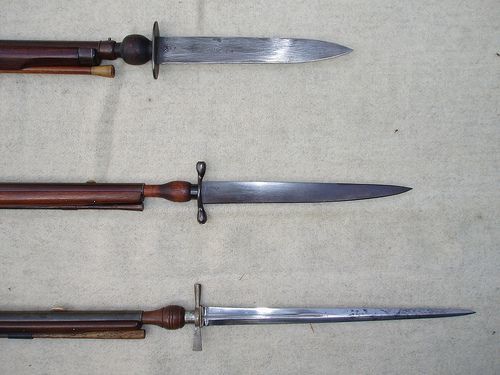
Our position had now grown fearfully critical. The mules still blocked up the entrance, preventing the soldiers from taking shelter behind the stockade; and before we could reload, the rearmost would be at the mercy of the enemy’s lances. Seizing the major’s servant by the arm, I dragged him from his horse, and, leaping into the saddle, flung myself upon the rear. Half a dozen of my bravest men, among whom were Lincoln, Chane, and the Frenchman Raoul, rallied around the horse, determined to receive the cavalry charge on the short bayonets of their rifles. Their pieces were all empty!
At this moment my eye rested on one of the soldiers, a brave but slow-footed German, who was still twenty paces in the rear of his comrades, making every effort to come up. Two of the guerilleros were rushing upon him with couched lances. I galloped out to his rescue; but before I could reach him the lance of the foremost Mexican crashed through the soldier’s skull, shivering it like a shell. The barb and bloody pennon came out on the opposite side. The man was lifted from the ground, and carried several paces upon the shaft of the lance.The guerillero dropped his entangled weapon; but before he could draw any other, the sword of Victoria was through his heart.
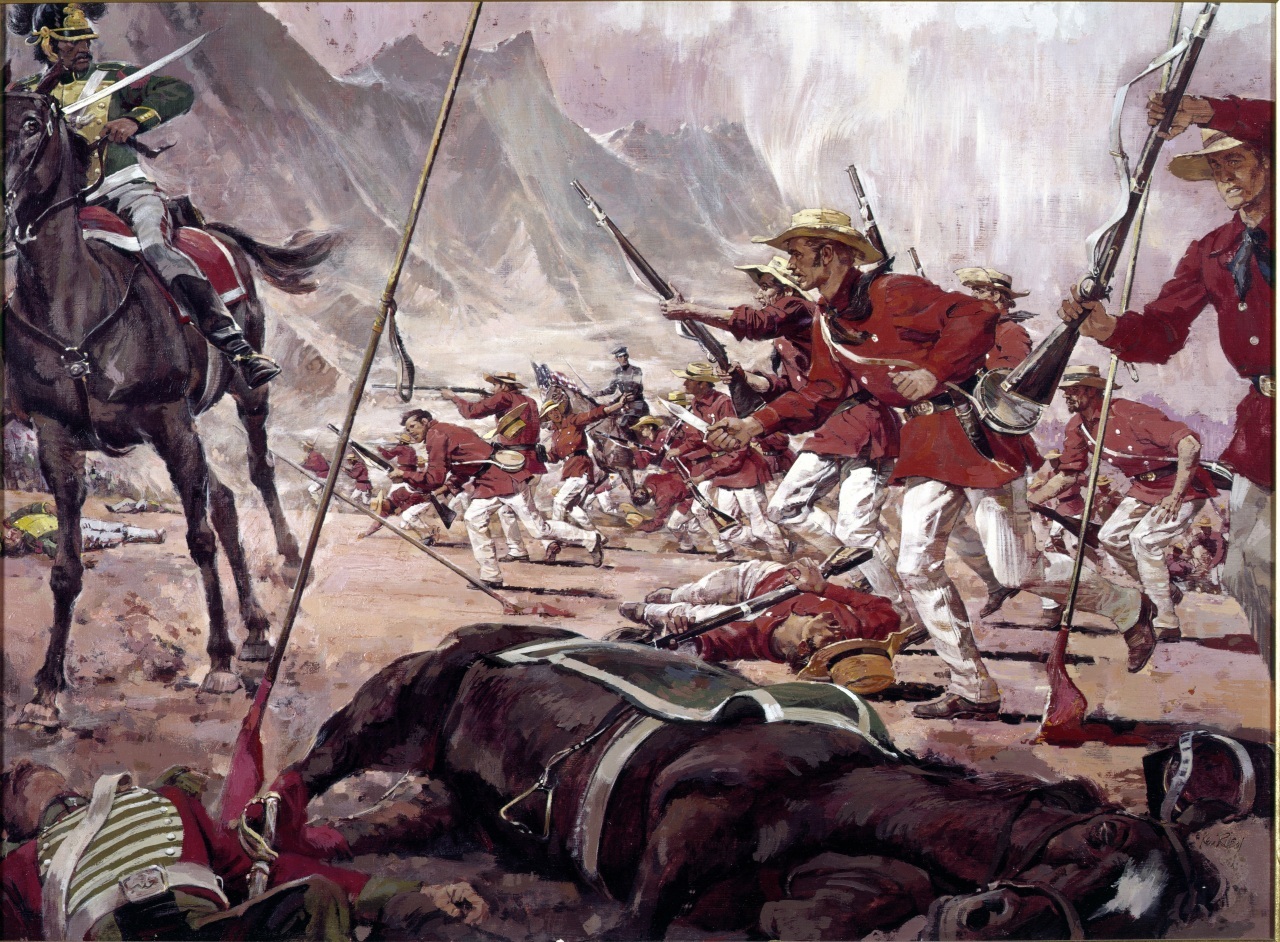
His comrade turned upon me with a cry of vengeance. I had not yet disengaged my weapon to ward off the thrust. The lance’s point was within three feet of my breast, when a sharp crack was heard from behind; the lancer threw out his arms with a spasmodic jerk; his long spear was whirled into the air, and he fell back in his saddle, dead. “Well done, Jack! fire and scissors! who showed yer that trick? whooray! whoop!” and I heard the voice of Lincoln, in a sort of Indian yell, rising high above the din.
The whole skirmish did not occupy two minutes. It was like most charges of Mexican cavalry-a dash, a wild yelling, half a dozen empty saddles, and a hasty retreat. The guerilleros had swerved off as soon as they perceived that we had gained a safe position, and the bullets of our reloaded pieces began to whistle around their ears.
...Mexicans. The latter were now out upon the prairie, beyond the range of small-arms, grouped around their wounded comrades, or galloping to and fro, with yells of disappointed vengeance.
I entered the corral, where most of my men had sheltered themselves behind the stockades. Little Jack sat upon Twidget, reloading his rifle, and trying to appear insensible to the flattering encomiums that hailed him from all sides. A compliment from Lincoln, however, was too much for Jack, and a proud smile was seen upon the face of the boy. “Thank you, Jack,” said I, as I passed him; “I see you can use a rifle to some purpose.” Jack held down his head, without saying a word, and appeared to be very busy about the lock of his piece.
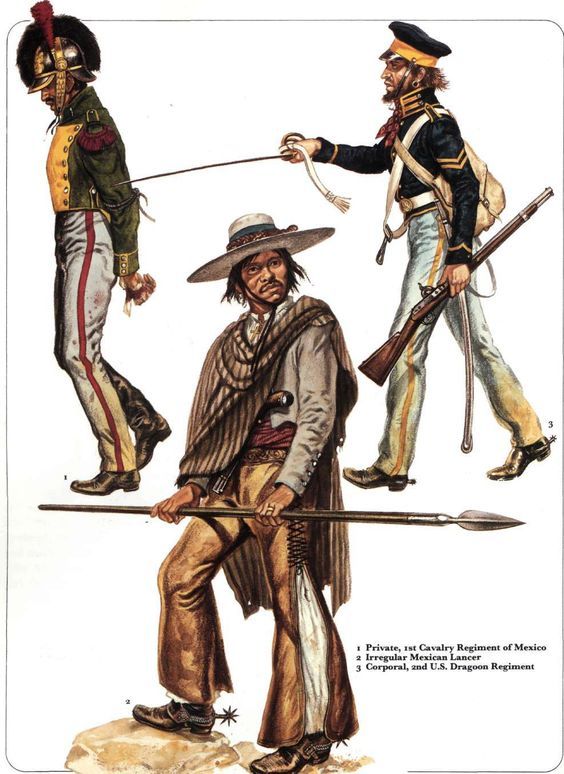
In the skirmish, Lincoln had received the scratch of a lance, at which he was chafing in his own peculiar way, and vowing revenge upon the giver. It might be said that he had taken this, as he had driven his short bayonet through his antagonist’s arm, and sent him off with this member hanging by his side. But the hunter was not content; and, as he retired sullenly into the inclosure, he turned round, and, shaking his fist at the Mexican, muttered savagely:“Yer darned skunk! I’ll know yer agin. See if I don’t git yer yit!”
Gravenitz, a Prussian soldier, had also been too near a lance, and several others had received slight wounds. The German was the only one killed. He was still lying out on the plain, where he had fallen, the long shaft of the lance standing up out of his skull. Not ten feet distant lay the corpse, of his slayer, glistening in its gaudy and picturesque attire.
I began to reflect upon the real danger of our situation-corralled upon a naked prairie, ten miles from camp, with no prospect of escape. I knew that we could defend ourselves against twice the number of our cowardly adversaries; they would never dare to come within range of our rifles. But how to get out? how to cross the open plain? Fifty infantry against four times that number of mounted men-lancers at that-and not a bush to shelter the foot-soldier from the long spear and the iron hoof!
The nearest motte was half a mile off, and that another half a mile from the edge of the woods. Even could the motte be reached by a desperate run, it would be impossible to gain the woods, as the enemy would certainly cordon our new position, and thus completely cut us off. At present they had halted in a body about four hundred yards from the corral; and, feeling secure of having us in a trap, most of them had dismounted, and were running out their mustangs upon their lazos. It was plainly their determination to take us by siege.
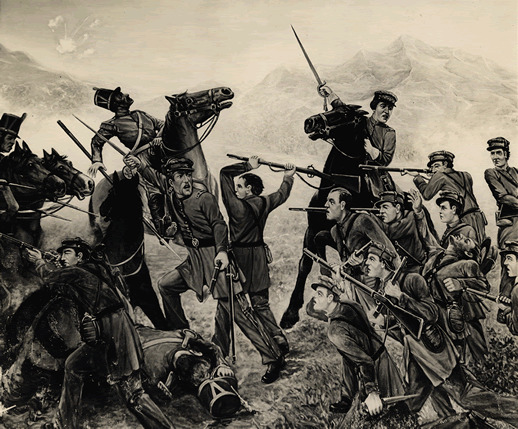
Итак - рота из 50 стрелков была атакована двумя сотнями всадников с пиками, идущих лавой, успела кое-как построиться и дать один залп, который стоил противнику нескольких убитых, после чего побежала в укрытие - загон для скота, преследуемая кавалеристами, которые стреляли из мушкетонов и пистолетов, и успели подколоть насмерть одного бойца и ранить нескольких. При этом пехотинцы пытались отбиваться штыками, а в ходе преследования погибло еще двое нападавших - один от шпаги ГГ, второй от меткого выстрела бой-скаута. Укрывшись в загоне, они перезарядили винтовки, а мексиканцы отступили на 400 ярдов, где расположились в полнейшей безмятежности, что значит это была для винтовок стрелковой роты запредельная дистанция....
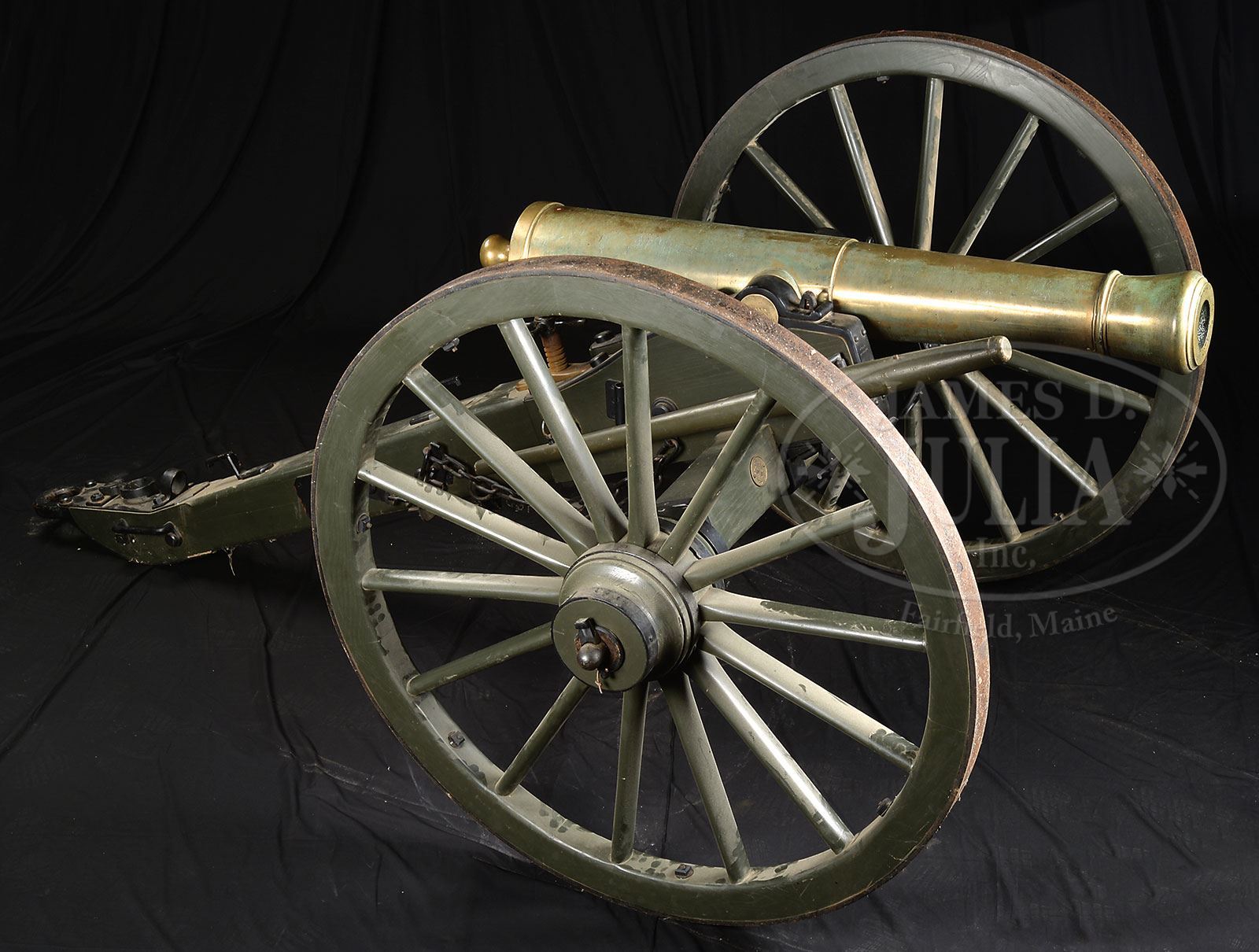
Presently the dust was wafted aside, a dozen dark forms became visible, and in the midst a bright object flashed under the sun like a sheet of gold. At the same instant an insulting shout broke from the guerilleros, and a voice was heard exclaiming: “Cenobio! Cenobio! Los canones!” (Cenobio! Cenobio! the cannon!)
“A brass piece, as I live!-a six-pound carronade!” “Neither stockade nor motte will avail us now.” “What is to be done?” asked my companion.“Nothing but die with arms in our hands. We will not die without a struggle, and the sooner we prepare for it the better.”
“My brave comrades!” cried I, “they have got the advantage of us at last. They are bringing down a piece of artillery, and I fear these pickets will offer us but poor shelter. If we are driven out, let us strike for that island of timber; and, mark me-if we are broken, let every man fight his way as he best can, or die over a fallen enemy. But let us first see how they use their piece. It is a small one, and will not destroy us all at once. Fling yourselves down as they fire. By lying flat on your faces you may not suffer so badly. Perhaps we can hold the corral until our friends reach us. At all events we shall try.”
The six-pounder had now approached within five hundred yards of the stockade, and was leisurely being unlimbered in the midst of a group of the enemy’s artillerists.At this moment the voice of the major arrested my attention. “Great heaven, Captain! Why do you allow them to come so near?”
“How am I to prevent them?” I asked, with some surprise. “Why, my rifle will reach farther than that. It might keep them off, I think.” “Major, you are dreaming!” said I. “They are two hundred yards beyond range of our rifles. If they would only come within that, we should soon send them back for you.” “But, Captain, mine will carry twice the distance. It’s a zündnadel, and will kill at eight hundred yards.”
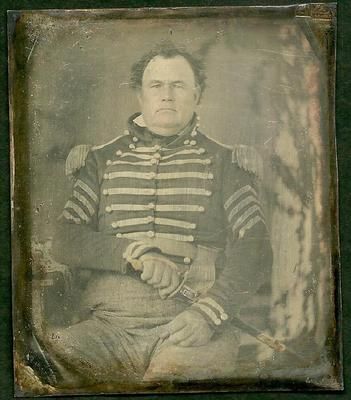
“Is it possible?” cried I, starting; for I now recollected the curious-looking piece which I had ordered to be cut loose from the saddle of Hercules. “Why did you not tell me that before? Where is Major Blossom’s rifle?” I shouted, looking around.“This hyur’s the major’s gun” answered Sergeant Lincoln. “But if it’s a rifle, I never seed sich. It looks more like a two-year old cannon.”It was, as the major had declared, a Prussian needle-gun-then a new invention, but of which I had heard something. “Is it loaded, Major?” I asked, taking the piece from Lincoln. “It is.” “Can you hit that man with the sponge?” said I, returning the piece to the hunter. “If this hyur thing’ll carry fur enuf, I kin,” was the reply.
“It will kill at a thousand yards, point blank,” cried the major, with energy.“Ha! are you sure of that, Major?” I asked. “Certainly, Captain. I got it from the inventor. We tried it at Washington. It is loaded with a conical bullet. It bored a hole through an inch plank at that distance.” “Well. Now, Sergeant, take sure aim; this may save us yet.” Lincoln planted himself firmly on his feet, choosing a notch of the stockade that ranged exactly with his shoulder. He then carefully wiped the dust from the sights; and, placing the heavy barrel in the notch, laid his cheek slowly against the stock. “Sergeant, the man with the shot!” I called out.
As I spoke, one of the artillerists was stooping to the muzzle of the six-pounder, holding in his hand a spherical case-shot. Lincoln pressed the trigger. The crack followed, and the artillerist threw out his arms, and doubled over on his head without giving a kick. The shot that he had held rolled out upon the green-sward. A wild cry, expressive of extreme astonishment, broke from the guerilleros. At the same instant a cheer rang through the corral. “Well done!” cried a dozen of voices at once. In a moment the rifle was wiped and reloaded.
“This time, Sergeant, the fellow with the linstock.” During the reloading of the rifle, the Mexicans around the six-pounder had somewhat recovered from their surprise, and had rammed home the cartridge. A tall artillerist stood, with linstock and fuse, near the breech, waiting for the order to fire. Before he received that order the rifle again cracked; his arm new up with a sudden jerk, and the smoking rod, flying from his grasp, was projected to the distance of twenty feet.The man himself spun round, and, staggering a pace or two, fell into the arms of his comrades.
But before Lincoln could reload, one of the Mexicans, apparently an officer, had snatched up the burning fuse, and, running up, applied it to the touch. “On your faces, men!” The ball came crashing through the thin pickets of the corral, and, whizzing across the inclosure, struck one of the mules on the flank, tearing open its hip, causing it to kick furiously as it tumbled over the ground.
The guerilleros galloped back; and the artillerists, wheeling the six-pounder, dragged it after, and took up a new position about three hundred yards farther to the rear. A second shot from the piece again tore through the pickets, striking one of our men, and killing him instantly. “Aim at the artillerists, Sergeant. We have nothing to fear from the others.”Lincoln fired again. The shot hit the ground in front of the enemy’s gun; but, glancing, it struck one of the cannoniers, apparently wounding him badly, as he was carried back by his comrades.The Mexicans, terror-struck at this strange instrument of destruction, took up a new position, two hundred yards still farther back.
Their third shot ricocheted, striking the top of the strong plank behind which the major was screening himself, and only frightening the latter by the shock upon the timber. Lincoln again fired. This time his shot produced no visible effect, and a taunting cheer from the enemy told that they felt themselves beyond range. Another shot was fired from the zündnadel, apparently with a similar result. “It’s beyond her carry, Cap’n,” said Lincoln, bringing the butt of his piece to the ground, with an expression of reluctant conviction. “Try one more shot. If it fail, we can reserve the other for closer work. Aim high!” This resulted as the two preceding ones; and a voice from the guerilleros was heard exclaiming: “Yankees bobos! mas adelante!” (A little farther, you Yankee fools!)
Another shot from the six-pounder cracked through the planks, knocking his piece from the hands of a soldier, and shivering the dry stock-wood into fifty fragments. “Sergeant, give me the rifle,” said I. “They must be a thousand yards off; but, as they are as troublesome with that carronade as if they were only ten, I shall try one more shot.” I fired, but the ball sank at least fifty paces in front of the enemy. “We expect too much. It is not a twenty-four pounder. Major, I envy you two things-your rifle and your horse.”
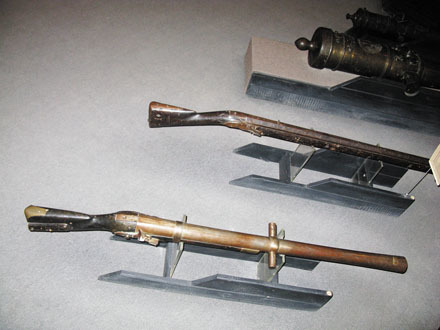
Противник, не будь дурак подтянул легкое орудие, в книге оно обозвано каронадой, но скорее это обычная легкая пушка - четырех- или шести-фунтовка. Стреляет ядрами. Первоначально ее установили в 500 ярдах, что было далеко за радиусом действия винтовок роты, который исходя из слов героев не превышает 300 ярдов. Но на счастье у комичного персонажа - майора Блоссома, интенданта, который до этого отметился в книге только скверным характером, любовью к комфорту и отличным конем, чудесным образом с собой оказалось ВУНДЕРВАФФЕ... В книге почему-то считается, что это прусская игольная винтовка - zündnadel, но мне кажется это ошибка автора, или скорее редактора. Дело в том, что во-первых в 1846-47 годах эта система еще не была широко известна, получив известность позже, в революциях 48-го года, куда как раз собирался сам автор, а во-вторых - я конечно могу ошибаться, но стрельба на дальние дистанции как раз не была сильной стороной этой системы, так что сами пруссаки для своих егерей выпускали не игольные, а стержневые винтовки.
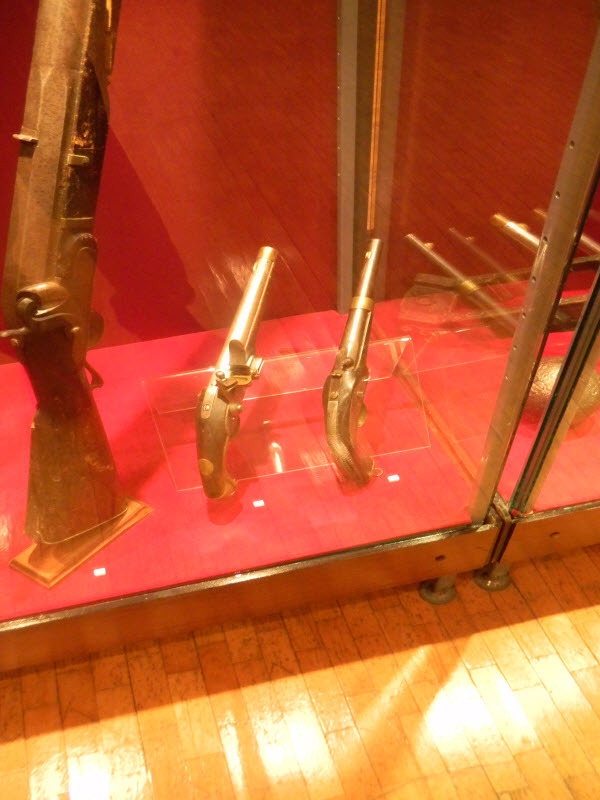
Вот именно оно, как мне кажется, на самом деле и имелось в виду. Учитывая, что само оружие вызывает удивление и кажется "личинкой пушки", упоминается "тяжелый ствол" - это ИМХО не обычный стержневой карабин, а крепостная винтовка, аналогичная отечественному стержневому крепостному капсюльному ружью обр. 1839 г. конструкции Куликовского. Оружие стреляет коническими пулями и оснащено регулируемым прицелом. По словам владельца, оно способно вести огонь на 800-1000 ярдов, причем на этой дистанции пробивает дюймовую доску. Наличие подобного "ствола" позволяет поражать расчет орудия сначала на 500, а затем и на 800 ярдах. Это хорошо соответствует реальной роли крепостных винтовок, предназначенных для работы по осаждающим и особенно по артиллерии. По сути это прямой аналог современных anti-material rifles. Пределом его становится дистанция примерно в 1000 ярдов, когда пули уже не долетают вообще....
“Now, my brave fellows,” shouted I in a loud voice, “we must take it cavalry fashion-Mexican cavalry, I mean.” The men laughed. “Once in the woods, we shall retreat no farther. At the words ‘Mount and follow’, spring to your seats and follow Mr Clayley.
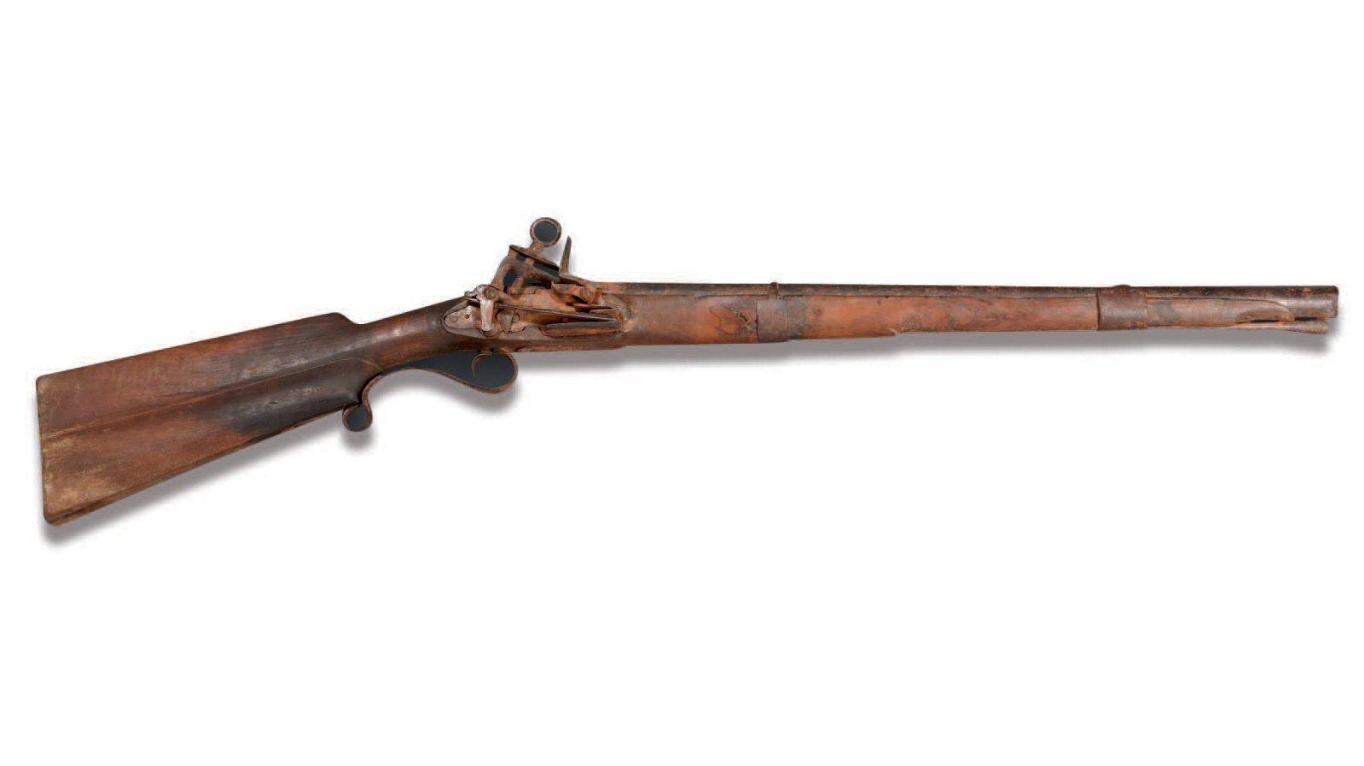
The pursuers were already within a hundred yards, firing their pistols and escopettes without effect. A number of the men turned in their seats and blazed back. Others threw their rifles over their shoulders, and pulled trigger at random. I could perceive that two or three guerilleros dropped from their saddles. Their comrades, with shouts of vengeance, closed upon us nearer and nearer. The long lazos, far in advance, whistled around our heads.
“But where are the guerilleros?” asked I, looking around, my brain still somewhat confused. “Yander they are, keepin’ safe out o’ range o’ this long gun. Just listen to ’em!-what a hillerballoo!”
The guerilleros now dismounted, tying their horses to the trees and preparing to cross over. One, who seemed to be their leader, judging from his brilliant dress and plumes, had already advanced into the stream, and stood upon a projecting rock with his sword drawn. He was not more than three hundred yards from the position we occupied on the bluff. “Do you think you can reach him?” I said to Lincoln, who had reloaded his gun, and stood eyeing the Mexican, apparently calculating the distance. “I’m feerd, Cap’n, he’s too fur. I’d guv a half-year’s sodger-pay for a crack out o’ the major’s Dutch gun. We can lose nothin’ in tryin’. Murter, will yer stan’ afore me? Thar ain’t no kiver, an’ the feller’s watchin’. He’ll dodge like a duck if he sees me takin’ sight on ’im.”
Chane threw his large body in front, and Lincoln, cautiously slipping his rifle over his comrade’s shoulder, sighted the Mexican. The latter had noticed the manoeuvre, and, perceiving the danger he had thrust himself into, was about turning to leap down from the rock when the rifle cracked-his plumed hat flew off, and throwing out his arms, he fell with a dead plunge upon the water! The next moment his body was sucked into the current, and, followed by his hat and plumes, was borne down the cañon with the velocity of lightning.Several of his comrades uttered a cry of terror; and those who had followed him out into the open channel ran back towards the bank, and screened themselves behind the rocks. A voice, louder than the rest, was heard exclaiming:“Carajo! guardaos!-esta el rifle del diablo!” (Look out! it is the devil’s rifle!) It was doubtless the comrade of José, who had been in the skirmish of La Virgen, and had felt the bullet of the zündnadel.
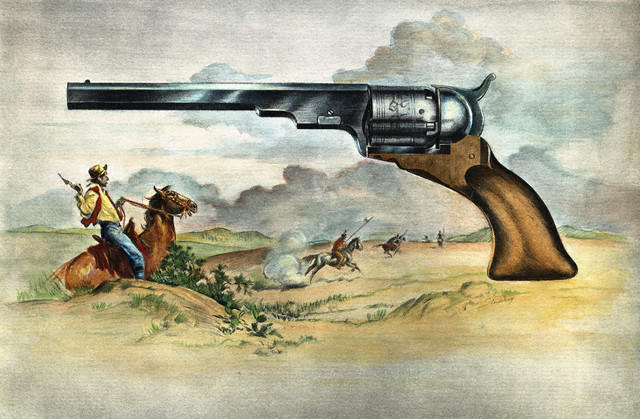
To Raoul I gave my revolving pistols, not expecting to have any further use for them myself; and to the hunter, that which he valued more than any other earthly object, the major’s “Dutch gun”. Doubtless, ere this, the zündnadel has slain many a “grisly b’ar” among the wild ravines of the Rocky Mountains.
В последующих отрывках еще раз подтверждается, что выстрел в стоящего человека на 300 ярдов - нетривиальная задача, а пистоли и мушкетоны - именно это слово наиболее точно, на мой взгляд, передает смысл испанского escopetta - это или короткий кавалерийский гладкоствольный карабин, или, чаще - короткий же кавалерийский мушкетон для стрельбы картечью с раструбом на конце ствола, характерное оружие испанской, латиноамериканской, североафриканской и турецкой кавалерии, эффективны только в упор... Характерно также, что чудо-винтовка называется то немецким, то голландским ружьем. Я же предположил что оно вообще бельгийское....
Если кому-то попадалось "Военная жизнь, или Приключения офицера легкой пехоты" [War Life; or, The Adventures of a Light Infantry Officers] (1849) - оригинал точно есть в американских библиотеках, почему-то не могу ее открыть на гугле, был бы весьма благодарен - реально интересно почитать и сравнить... Увлекся что-то я... Но если у вас есть перед глазами аналогичные примеры - это весьма интересно....

Неизвестный доброволец - стрелок, 1846-47 гг
На эту интерлюдию меня натолкнуло совершенно случайно упоминание в обсуждении прошлой интерлюдии произведений Томаса Майн Рида (я в курсе, что правильно было бы его второе имя произносить как Мэйн, но так уж исторически сложилось). Дело в том, что первое его литературное произведение (на самом деле я бы назвал его 1.5) - "Вольные стрелки" ("The Rifle Rangers"), опубликованное в 1850-м году и основанное на более раннем "Военная жизнь, или Приключения офицера легкой пехоты" [War Life; or, The Adventures of a Light Infantry Officers] (1849), которое я в электронном виде к сожалению не нашел, было основано на личном опыте - писатель воевал в чине второго лейтенанта в Первом Нью-Йоркском Волонтерском полку, участвовал в десанте под Вера-Крусом, а при штурме Чапультепека получил тяжелое ранение в бедро. Потому, несмотря на то, что перед нами несомненно прежде всего литературное произведение, изобилующие романтичными штампами того времени: благородный герой, подлый соперник, верные помощники, схватка с крокодилом, прекрасная сеньорита с усами - я не шучу "and a dark shading along the upper lip-a moustache, in fact-soft and silky as the tracery of a crayon, contrasted with the dazzling whiteness of her teeth......the dark tracery over the lip, so rarely seen in the lineaments of her sex-even these were attractions.", произведение дает нам довольно интересный пример схватки волонтерской стрелковой роты, вооруженной скорее всего Model 1841 U.S. Percussion Rifle, .54, она же “Jager,” (“Yager” и “Yaeger”) и частично возможно личными винтовками, с мексиканской иррегулярной кавалерией, а затем артиллерией, и применения дальнобойной винтовки европейского происхождения, на мой взгляд скорее всего стержневой крепостной винтовки, для подавления легкого мексиканского орудия.... Надо сказать ,что русский перевод, как водится, говно полное, есть мнение что переводили не с оригинала, а как тогда было принято - с французского перевода ,а потом только перевели на новую орфографию. Потому советую ориентироваться на оригинал. Начнем-с:

My sword-a fine Toledo, taken from a Spanish officer at San Jacinto-hung over the mantel, rusting ingloriously. Near it were my pistols-a pair of Colt’s revolvers-pointing at each other in sullen muteness. A warlike ardour seized upon me, and clutching, not the sword, but my pen, I wrote to the War Department for a commission; and, summoning all my patience, awaited the answer.

ГГ выборный капитан некой роты вольных стрелков - добровольческого подразделения Армии САСШ, сформированной в Новом Орлеане и вооруженных некими rifles. После высадки под Вера-Крусом роте ставится задача добыть мулов и они направляются вглубь враждебной территории. В роте есть мальчик-кавалерист с оружием на его рост: Jack wore a tight-fitting green jacket, trimmed with yellow lace, and buttoned up to the throat; pantaloons of light green, straight cut, and striped along the seams; a forage-cap set jauntily upon a profusion of bright curls; a sabre with a blade of eighteen inches, and a pair of clinking Mexican spurs. Besides these, he carried the smallest of all rifles. Thus armed and accoutred, he presented the appearance of a miniature Ranger. Для начала ГГ со своими людьми сталкивается таки с мексиканским кайманом: I had brought with me a light rifle. It was but the work of a moment to unsling and level it. The sharp crack followed, and the ball impinged between the monster’s eyes, glancing harmlessly from his hard skull as though it had been a plate of steel. The shot was an idle one, perhaps worse; for, stung to madness with the stunning shock, the reptile sprang far out into the water, and made directly for its victims.

Противник - мексиканский застрельщик с винтовкой Бейкера со штыком...
Т.е. личная винтовка/штуцер героя крокодильчика не взяла....В тот период боевые офицеры часто носили нарезные штуцера, сделанные на заказ.... При этом у винтовок упоминаются штыки, что для М1841 странно. Впрочем в те годы встречается упоминание использования в качестве штыка, а точнее багинета, ножей и кинжалов..... Цвет формы по описанию тоже необычный, но у волонтеров-стрелков возможно было такое....

Потом они, найдя табун мулов, пытаются загнать его в корраль, но подвергаются атаке иррегулярной кавалерии - Rurales. Приведу все, что привлекло моё внимание в этом отрывке, а ниже дам его понимание (не перевод) на русском:
The mules were already within fifty paces of the entrance, the soldiers coming up about two hundred yards in the rear, when a noise like the tramping of many hoofs arrested our attention. The quick, sharp note of a cavalry bugle rang out across the plain, followed by a wild yell, as though a band of Indian warriors were sweeping down upon the foe.In an instant every eye was turned, and we beheld with consternation a cloud of horsemen springing out from the woods, and dashing along in the headlong velocity of a charge. It required but a single glance to satisfy me that they were guerilleros. Their picturesque attire, their peculiar arms, and the parti-coloured bannerets upon their lances were not to be mistaken.
We stood for a moment as if thunderstruck; a sharp cry rose along the deployed line. I signalled to the bugler, who gave the command, “Rally upon the centre!” As if by one impulse, the whole line closed in with a run upon the gates of the inclosure. The mules, impelled by the sudden rush, dashed forward pell-mell, blocking up the entrance. On came the guerilleros, with streaming pennons and lances couched, shouting their wild cries: “Andela! andela! Mueran los Yankees!” (Forward! forward! Death to the Yankees!)

The foremost of the soldiers were already upon the heels of the crowded mules, pricking them with bayonets. The animals began to kick and plunge in the most furious manner, causing a new danger in front.“Face about-fire!” I commanded at this moment. An irregular but well-directed volley emptied half a dozen saddles, and for a moment staggered the charging line; but, before my men could reload, the guerilleros had leaped clear over their fallen comrades, and were swooping down with cries of vengeance. A dozen of their bravest men were already within shot-range, firing their escopettes and pistols as they came down.

Our position had now grown fearfully critical. The mules still blocked up the entrance, preventing the soldiers from taking shelter behind the stockade; and before we could reload, the rearmost would be at the mercy of the enemy’s lances. Seizing the major’s servant by the arm, I dragged him from his horse, and, leaping into the saddle, flung myself upon the rear. Half a dozen of my bravest men, among whom were Lincoln, Chane, and the Frenchman Raoul, rallied around the horse, determined to receive the cavalry charge on the short bayonets of their rifles. Their pieces were all empty!
At this moment my eye rested on one of the soldiers, a brave but slow-footed German, who was still twenty paces in the rear of his comrades, making every effort to come up. Two of the guerilleros were rushing upon him with couched lances. I galloped out to his rescue; but before I could reach him the lance of the foremost Mexican crashed through the soldier’s skull, shivering it like a shell. The barb and bloody pennon came out on the opposite side. The man was lifted from the ground, and carried several paces upon the shaft of the lance.The guerillero dropped his entangled weapon; but before he could draw any other, the sword of Victoria was through his heart.

His comrade turned upon me with a cry of vengeance. I had not yet disengaged my weapon to ward off the thrust. The lance’s point was within three feet of my breast, when a sharp crack was heard from behind; the lancer threw out his arms with a spasmodic jerk; his long spear was whirled into the air, and he fell back in his saddle, dead. “Well done, Jack! fire and scissors! who showed yer that trick? whooray! whoop!” and I heard the voice of Lincoln, in a sort of Indian yell, rising high above the din.
The whole skirmish did not occupy two minutes. It was like most charges of Mexican cavalry-a dash, a wild yelling, half a dozen empty saddles, and a hasty retreat. The guerilleros had swerved off as soon as they perceived that we had gained a safe position, and the bullets of our reloaded pieces began to whistle around their ears.
...Mexicans. The latter were now out upon the prairie, beyond the range of small-arms, grouped around their wounded comrades, or galloping to and fro, with yells of disappointed vengeance.
I entered the corral, where most of my men had sheltered themselves behind the stockades. Little Jack sat upon Twidget, reloading his rifle, and trying to appear insensible to the flattering encomiums that hailed him from all sides. A compliment from Lincoln, however, was too much for Jack, and a proud smile was seen upon the face of the boy. “Thank you, Jack,” said I, as I passed him; “I see you can use a rifle to some purpose.” Jack held down his head, without saying a word, and appeared to be very busy about the lock of his piece.

In the skirmish, Lincoln had received the scratch of a lance, at which he was chafing in his own peculiar way, and vowing revenge upon the giver. It might be said that he had taken this, as he had driven his short bayonet through his antagonist’s arm, and sent him off with this member hanging by his side. But the hunter was not content; and, as he retired sullenly into the inclosure, he turned round, and, shaking his fist at the Mexican, muttered savagely:“Yer darned skunk! I’ll know yer agin. See if I don’t git yer yit!”
Gravenitz, a Prussian soldier, had also been too near a lance, and several others had received slight wounds. The German was the only one killed. He was still lying out on the plain, where he had fallen, the long shaft of the lance standing up out of his skull. Not ten feet distant lay the corpse, of his slayer, glistening in its gaudy and picturesque attire.
I began to reflect upon the real danger of our situation-corralled upon a naked prairie, ten miles from camp, with no prospect of escape. I knew that we could defend ourselves against twice the number of our cowardly adversaries; they would never dare to come within range of our rifles. But how to get out? how to cross the open plain? Fifty infantry against four times that number of mounted men-lancers at that-and not a bush to shelter the foot-soldier from the long spear and the iron hoof!
The nearest motte was half a mile off, and that another half a mile from the edge of the woods. Even could the motte be reached by a desperate run, it would be impossible to gain the woods, as the enemy would certainly cordon our new position, and thus completely cut us off. At present they had halted in a body about four hundred yards from the corral; and, feeling secure of having us in a trap, most of them had dismounted, and were running out their mustangs upon their lazos. It was plainly their determination to take us by siege.

Итак - рота из 50 стрелков была атакована двумя сотнями всадников с пиками, идущих лавой, успела кое-как построиться и дать один залп, который стоил противнику нескольких убитых, после чего побежала в укрытие - загон для скота, преследуемая кавалеристами, которые стреляли из мушкетонов и пистолетов, и успели подколоть насмерть одного бойца и ранить нескольких. При этом пехотинцы пытались отбиваться штыками, а в ходе преследования погибло еще двое нападавших - один от шпаги ГГ, второй от меткого выстрела бой-скаута. Укрывшись в загоне, они перезарядили винтовки, а мексиканцы отступили на 400 ярдов, где расположились в полнейшей безмятежности, что значит это была для винтовок стрелковой роты запредельная дистанция....

Presently the dust was wafted aside, a dozen dark forms became visible, and in the midst a bright object flashed under the sun like a sheet of gold. At the same instant an insulting shout broke from the guerilleros, and a voice was heard exclaiming: “Cenobio! Cenobio! Los canones!” (Cenobio! Cenobio! the cannon!)
“A brass piece, as I live!-a six-pound carronade!” “Neither stockade nor motte will avail us now.” “What is to be done?” asked my companion.“Nothing but die with arms in our hands. We will not die without a struggle, and the sooner we prepare for it the better.”
“My brave comrades!” cried I, “they have got the advantage of us at last. They are bringing down a piece of artillery, and I fear these pickets will offer us but poor shelter. If we are driven out, let us strike for that island of timber; and, mark me-if we are broken, let every man fight his way as he best can, or die over a fallen enemy. But let us first see how they use their piece. It is a small one, and will not destroy us all at once. Fling yourselves down as they fire. By lying flat on your faces you may not suffer so badly. Perhaps we can hold the corral until our friends reach us. At all events we shall try.”
The six-pounder had now approached within five hundred yards of the stockade, and was leisurely being unlimbered in the midst of a group of the enemy’s artillerists.At this moment the voice of the major arrested my attention. “Great heaven, Captain! Why do you allow them to come so near?”
“How am I to prevent them?” I asked, with some surprise. “Why, my rifle will reach farther than that. It might keep them off, I think.” “Major, you are dreaming!” said I. “They are two hundred yards beyond range of our rifles. If they would only come within that, we should soon send them back for you.” “But, Captain, mine will carry twice the distance. It’s a zündnadel, and will kill at eight hundred yards.”

“Is it possible?” cried I, starting; for I now recollected the curious-looking piece which I had ordered to be cut loose from the saddle of Hercules. “Why did you not tell me that before? Where is Major Blossom’s rifle?” I shouted, looking around.“This hyur’s the major’s gun” answered Sergeant Lincoln. “But if it’s a rifle, I never seed sich. It looks more like a two-year old cannon.”It was, as the major had declared, a Prussian needle-gun-then a new invention, but of which I had heard something. “Is it loaded, Major?” I asked, taking the piece from Lincoln. “It is.” “Can you hit that man with the sponge?” said I, returning the piece to the hunter. “If this hyur thing’ll carry fur enuf, I kin,” was the reply.
“It will kill at a thousand yards, point blank,” cried the major, with energy.“Ha! are you sure of that, Major?” I asked. “Certainly, Captain. I got it from the inventor. We tried it at Washington. It is loaded with a conical bullet. It bored a hole through an inch plank at that distance.” “Well. Now, Sergeant, take sure aim; this may save us yet.” Lincoln planted himself firmly on his feet, choosing a notch of the stockade that ranged exactly with his shoulder. He then carefully wiped the dust from the sights; and, placing the heavy barrel in the notch, laid his cheek slowly against the stock. “Sergeant, the man with the shot!” I called out.
As I spoke, one of the artillerists was stooping to the muzzle of the six-pounder, holding in his hand a spherical case-shot. Lincoln pressed the trigger. The crack followed, and the artillerist threw out his arms, and doubled over on his head without giving a kick. The shot that he had held rolled out upon the green-sward. A wild cry, expressive of extreme astonishment, broke from the guerilleros. At the same instant a cheer rang through the corral. “Well done!” cried a dozen of voices at once. In a moment the rifle was wiped and reloaded.
“This time, Sergeant, the fellow with the linstock.” During the reloading of the rifle, the Mexicans around the six-pounder had somewhat recovered from their surprise, and had rammed home the cartridge. A tall artillerist stood, with linstock and fuse, near the breech, waiting for the order to fire. Before he received that order the rifle again cracked; his arm new up with a sudden jerk, and the smoking rod, flying from his grasp, was projected to the distance of twenty feet.The man himself spun round, and, staggering a pace or two, fell into the arms of his comrades.
But before Lincoln could reload, one of the Mexicans, apparently an officer, had snatched up the burning fuse, and, running up, applied it to the touch. “On your faces, men!” The ball came crashing through the thin pickets of the corral, and, whizzing across the inclosure, struck one of the mules on the flank, tearing open its hip, causing it to kick furiously as it tumbled over the ground.
The guerilleros galloped back; and the artillerists, wheeling the six-pounder, dragged it after, and took up a new position about three hundred yards farther to the rear. A second shot from the piece again tore through the pickets, striking one of our men, and killing him instantly. “Aim at the artillerists, Sergeant. We have nothing to fear from the others.”Lincoln fired again. The shot hit the ground in front of the enemy’s gun; but, glancing, it struck one of the cannoniers, apparently wounding him badly, as he was carried back by his comrades.The Mexicans, terror-struck at this strange instrument of destruction, took up a new position, two hundred yards still farther back.
Their third shot ricocheted, striking the top of the strong plank behind which the major was screening himself, and only frightening the latter by the shock upon the timber. Lincoln again fired. This time his shot produced no visible effect, and a taunting cheer from the enemy told that they felt themselves beyond range. Another shot was fired from the zündnadel, apparently with a similar result. “It’s beyond her carry, Cap’n,” said Lincoln, bringing the butt of his piece to the ground, with an expression of reluctant conviction. “Try one more shot. If it fail, we can reserve the other for closer work. Aim high!” This resulted as the two preceding ones; and a voice from the guerilleros was heard exclaiming: “Yankees bobos! mas adelante!” (A little farther, you Yankee fools!)
Another shot from the six-pounder cracked through the planks, knocking his piece from the hands of a soldier, and shivering the dry stock-wood into fifty fragments. “Sergeant, give me the rifle,” said I. “They must be a thousand yards off; but, as they are as troublesome with that carronade as if they were only ten, I shall try one more shot.” I fired, but the ball sank at least fifty paces in front of the enemy. “We expect too much. It is not a twenty-four pounder. Major, I envy you two things-your rifle and your horse.”

Противник, не будь дурак подтянул легкое орудие, в книге оно обозвано каронадой, но скорее это обычная легкая пушка - четырех- или шести-фунтовка. Стреляет ядрами. Первоначально ее установили в 500 ярдах, что было далеко за радиусом действия винтовок роты, который исходя из слов героев не превышает 300 ярдов. Но на счастье у комичного персонажа - майора Блоссома, интенданта, который до этого отметился в книге только скверным характером, любовью к комфорту и отличным конем, чудесным образом с собой оказалось ВУНДЕРВАФФЕ... В книге почему-то считается, что это прусская игольная винтовка - zündnadel, но мне кажется это ошибка автора, или скорее редактора. Дело в том, что во-первых в 1846-47 годах эта система еще не была широко известна, получив известность позже, в революциях 48-го года, куда как раз собирался сам автор, а во-вторых - я конечно могу ошибаться, но стрельба на дальние дистанции как раз не была сильной стороной этой системы, так что сами пруссаки для своих егерей выпускали не игольные, а стержневые винтовки.

Вот именно оно, как мне кажется, на самом деле и имелось в виду. Учитывая, что само оружие вызывает удивление и кажется "личинкой пушки", упоминается "тяжелый ствол" - это ИМХО не обычный стержневой карабин, а крепостная винтовка, аналогичная отечественному стержневому крепостному капсюльному ружью обр. 1839 г. конструкции Куликовского. Оружие стреляет коническими пулями и оснащено регулируемым прицелом. По словам владельца, оно способно вести огонь на 800-1000 ярдов, причем на этой дистанции пробивает дюймовую доску. Наличие подобного "ствола" позволяет поражать расчет орудия сначала на 500, а затем и на 800 ярдах. Это хорошо соответствует реальной роли крепостных винтовок, предназначенных для работы по осаждающим и особенно по артиллерии. По сути это прямой аналог современных anti-material rifles. Пределом его становится дистанция примерно в 1000 ярдов, когда пули уже не долетают вообще....
“Now, my brave fellows,” shouted I in a loud voice, “we must take it cavalry fashion-Mexican cavalry, I mean.” The men laughed. “Once in the woods, we shall retreat no farther. At the words ‘Mount and follow’, spring to your seats and follow Mr Clayley.

The pursuers were already within a hundred yards, firing their pistols and escopettes without effect. A number of the men turned in their seats and blazed back. Others threw their rifles over their shoulders, and pulled trigger at random. I could perceive that two or three guerilleros dropped from their saddles. Their comrades, with shouts of vengeance, closed upon us nearer and nearer. The long lazos, far in advance, whistled around our heads.
“But where are the guerilleros?” asked I, looking around, my brain still somewhat confused. “Yander they are, keepin’ safe out o’ range o’ this long gun. Just listen to ’em!-what a hillerballoo!”
The guerilleros now dismounted, tying their horses to the trees and preparing to cross over. One, who seemed to be their leader, judging from his brilliant dress and plumes, had already advanced into the stream, and stood upon a projecting rock with his sword drawn. He was not more than three hundred yards from the position we occupied on the bluff. “Do you think you can reach him?” I said to Lincoln, who had reloaded his gun, and stood eyeing the Mexican, apparently calculating the distance. “I’m feerd, Cap’n, he’s too fur. I’d guv a half-year’s sodger-pay for a crack out o’ the major’s Dutch gun. We can lose nothin’ in tryin’. Murter, will yer stan’ afore me? Thar ain’t no kiver, an’ the feller’s watchin’. He’ll dodge like a duck if he sees me takin’ sight on ’im.”
Chane threw his large body in front, and Lincoln, cautiously slipping his rifle over his comrade’s shoulder, sighted the Mexican. The latter had noticed the manoeuvre, and, perceiving the danger he had thrust himself into, was about turning to leap down from the rock when the rifle cracked-his plumed hat flew off, and throwing out his arms, he fell with a dead plunge upon the water! The next moment his body was sucked into the current, and, followed by his hat and plumes, was borne down the cañon with the velocity of lightning.Several of his comrades uttered a cry of terror; and those who had followed him out into the open channel ran back towards the bank, and screened themselves behind the rocks. A voice, louder than the rest, was heard exclaiming:“Carajo! guardaos!-esta el rifle del diablo!” (Look out! it is the devil’s rifle!) It was doubtless the comrade of José, who had been in the skirmish of La Virgen, and had felt the bullet of the zündnadel.

To Raoul I gave my revolving pistols, not expecting to have any further use for them myself; and to the hunter, that which he valued more than any other earthly object, the major’s “Dutch gun”. Doubtless, ere this, the zündnadel has slain many a “grisly b’ar” among the wild ravines of the Rocky Mountains.
В последующих отрывках еще раз подтверждается, что выстрел в стоящего человека на 300 ярдов - нетривиальная задача, а пистоли и мушкетоны - именно это слово наиболее точно, на мой взгляд, передает смысл испанского escopetta - это или короткий кавалерийский гладкоствольный карабин, или, чаще - короткий же кавалерийский мушкетон для стрельбы картечью с раструбом на конце ствола, характерное оружие испанской, латиноамериканской, североафриканской и турецкой кавалерии, эффективны только в упор... Характерно также, что чудо-винтовка называется то немецким, то голландским ружьем. Я же предположил что оно вообще бельгийское....
Если кому-то попадалось "Военная жизнь, или Приключения офицера легкой пехоты" [War Life; or, The Adventures of a Light Infantry Officers] (1849) - оригинал точно есть в американских библиотеках, почему-то не могу ее открыть на гугле, был бы весьма благодарен - реально интересно почитать и сравнить... Увлекся что-то я... Но если у вас есть перед глазами аналогичные примеры - это весьма интересно....